Top Self Help Books
<1 min read ⌚
In 1859, Samuel Smiles, a little-known Scottish government reformer, published his second book, a haphazard manual for reaching your highest potential. For its title, he chose the unassuming “Self-Help”, adding “with Illustrations of Character and Conduct” as a subtitle.
Overnight, he became a celebrity, “a leading pundit and a much-consulted guru.” Little did he know that he had started both a genre and a revolution.
One and a half century later, it’s safe to say that self help books are all the rage. Whether they strive to help you become a millionaire or a happier person, they come by the dozens on a weekly basis. So, how would you know which are the best ones?
That’s where we come in! We’ve rummaged through our database, memory and tens of booklists to choose the best self help books. So, you can just start reading them!
#1. “How to Win Friends and Influence People: The Only Book You Need to Lead You to Success” by Dale Carnegie
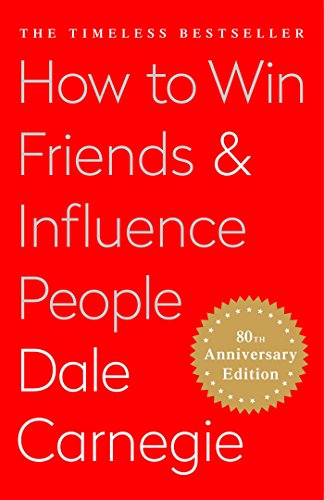 Samuel Smiles might have been the first one to write a self-help book, but Dale Carnegie was certainly the first one to take writing self-help books seriously and make it a full-time job.
Samuel Smiles might have been the first one to write a self-help book, but Dale Carnegie was certainly the first one to take writing self-help books seriously and make it a full-time job.
Published in 1936, “How to Win Friends and Influence People” is a classic sold in over 30 million copies. The fact that it was recently included in “Time Magazine’s” top 20 of list of most influential books in history speaks volumes about its timelessness.
Read this book to learn the six ways to make people like you. And, while you’re there, have a look at the nine ways you can change them. Or, maybe, the twelve ways to convince them that you’re right!
Don’t worry: they’ll think that it was the other way around!
#2. “Think and Grow Rich” by Napoleon Hill
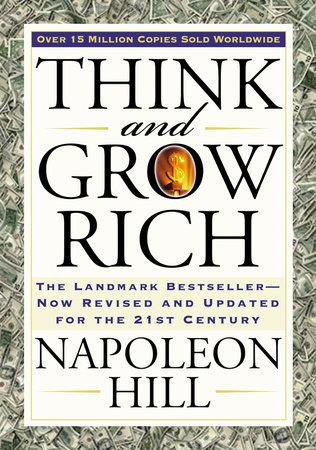 Just one year after Carnegie’s “How to Win Friends and Influence People,” another book you’re probably already familiar with was making the rounds. It still is, almost a century after it was first published.
Just one year after Carnegie’s “How to Win Friends and Influence People,” another book you’re probably already familiar with was making the rounds. It still is, almost a century after it was first published.
Inspired by a 1908 meeting with Andrew Carnegie, Napoleon Hill started a few-decades’ long investigation into the habits and philosophies of the rich and the successful.
His 1937 masterpiece, “Think and Grow Rich” is based on this research and the interviews he conducted over this period. And it’s essentially a 13-step philosophy of success.
The themes the book covers are the following ones: desire, faith, autosuggestion, specialized knowledge, imagination, organized planning, decision, persistence, power of the master mind, the mystery of sex transmutation, the subconscious mind, the brain, and the sixth sense.
Pervading throughout the book is the idea of the power of “positive thinking”. Which, as you may already know, is quite a popular genre nowadays by itself.
#3. “The 7 Habits of Highly Effective People: Powerful Lessons in Personal Change” by Stephen R. Covey
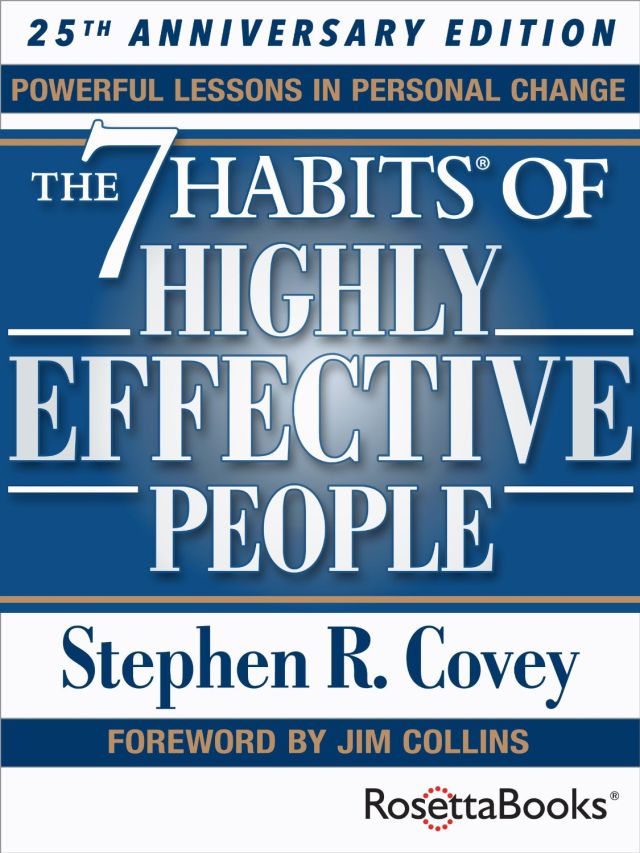 We fast forward half a century to the first non-fiction book to sell more than one million copies of its audio version: “The 7 Habits of Highly Effective People.” It’s one more self-help book focusing on success, and one of the many where there’s an exact number of life-changing actions you’re expected to take.
We fast forward half a century to the first non-fiction book to sell more than one million copies of its audio version: “The 7 Habits of Highly Effective People.” It’s one more self-help book focusing on success, and one of the many where there’s an exact number of life-changing actions you’re expected to take.
In this case, Stephen R. Covey opts for these seven habits: be proactive, begin with the end in mind, put first things first; think win-win, seek first to understand, then to be understood, synergize; sharpen the saw.
You may have noticed that we used two semicolons to organize Covey’s habits. Of course, there’s a reason why we did that. Namely, Covey thinks that the first three habits help develop your independence, while the second three furnish your interdependence skills. The final is the bridge.
Fifteen years later, Covey would add another habit to this list. And “The 8th Habit” was almost as popular as this chart-topper.
#4. “The Power of Now: An Incredible Masterpiece of Spiritual Enlightenment” by Eckhart Tolle
Eckhart Tolle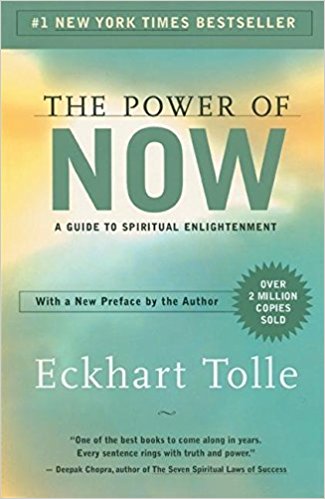 ‘s “The Power of Now” didn’t become an instant bestseller after its 1997 publication. But, after it was republished two years later, and endorsed by Oprah Winfrey and Meg Ryan in 2000, what was by that moment a word-of-mouth phenomenon, turned into one of the most sold and beloved self-improvement books in history.
‘s “The Power of Now” didn’t become an instant bestseller after its 1997 publication. But, after it was republished two years later, and endorsed by Oprah Winfrey and Meg Ryan in 2000, what was by that moment a word-of-mouth phenomenon, turned into one of the most sold and beloved self-improvement books in history.
The book blends psychology and spiritualism to give the old-age Zen Buddhist ideas a New-Age spin. And it seems that it does this in a brilliant manner since its philosophy resonates with readers from start to finish, from U.S. to Europe to Japan.
Its basic premise is the belief that, in order to be happy, you need to overcome your you’re your greatest enemy. You can do this through meditation and mindfulness, positive thinking and acceptance of suffering.
And you should start doing it as soon as you finish reading “The Power of Now.”
#5. “The Last Lecture” by Randy Pausch
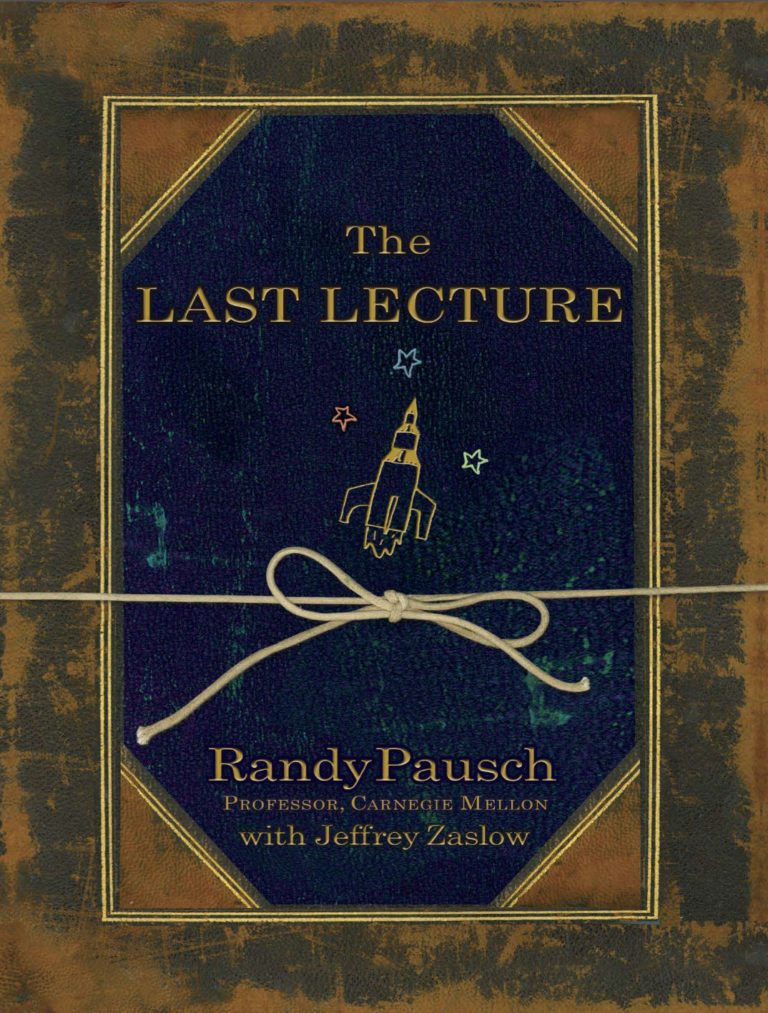 If you had one last lecture to give before you died – what would that lecture be?
If you had one last lecture to give before you died – what would that lecture be?
Randy Pausch, a computer science professor at Carnegie Mellon, didn’t need to imagine the answer to this question. Diagnosed with terminal cancer, he knew that he had barely few months left on this planet, when he was asked to talk at his alma mater.
The one-hour lecture, “Really Achieving Your Childhood Dreams,” has been viewed by almost 20 million people at YouTube; but, really, should be watched by millions more. Because, it’s so upbeat and inspiring, so gentle and wisdom-infused, that we bet few – if any – will remain unaffected and untouched.
It’s the same with the book. Randy Pausch spent the last few months of his life writing it, so you know he had some important things to share with you.
And if that’s not enough, take this into consideration as well. Just few years after it was published, this book became part of the English 100 curriculum of many schools. There are just too many “because” to list them.
#6. “The Greatest Salesman in the World” by Og Mandino
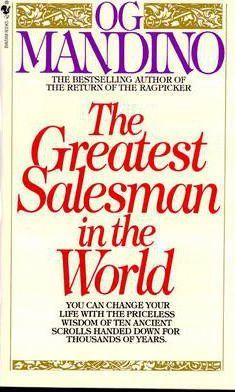 Og Mandino was an unsuccessful insurance salesman on the brink of suicide, when his life was profoundly changed by a self-help book. So, he decided to help others in the same way.
Og Mandino was an unsuccessful insurance salesman on the brink of suicide, when his life was profoundly changed by a self-help book. So, he decided to help others in the same way.
In fact, “The Greatest Salesman in the World,” is sometimes subtitled in this manner. “You can change your life with the priceless wisdom of ten ancient scrolls handed down for thousands of years.”
Of course, the history of the scrolls is fictive, but their lessons are not.
They start with an awe-inspiring dictum: “I will form good habits and become their slave.” And the pronouncement is followed by two similar ones in the third and the fourth scroll: “I will persist until I succeed” and “I am Nature’s greatest miracle.”
Scattered around these mottos, there are few life-changing advices by Mandino. These are: “greet each day with love in your heart,” “live each day as if it were your last,” “laugh,” “master your emotions,” “multiply your value every day,” and “pray to god for guidance.”
Because, as he writes in the inspiring ninth, “all is worthless without action.”
#7. “The Alchemist” by Paulo Coelho
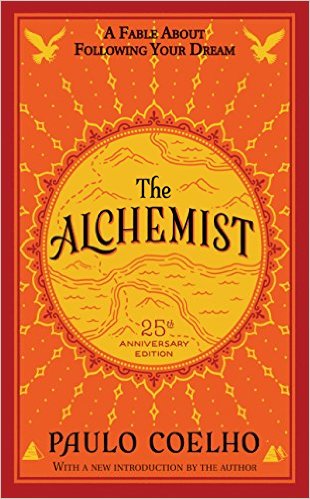 “The Alchemist” is actually a novel. But, probably, you already knew this, because – hey, who hasn’t read “The Alchemist”?
“The Alchemist” is actually a novel. But, probably, you already knew this, because – hey, who hasn’t read “The Alchemist”?
An international bestseller translated into 80 different languages, the book made Paulo Coelho a household name. Its lessons may be not as explicit as those of some other self-help books, but this makes them all the more profound and touching.
“The Alchemist” follows the journey of Santiago, an Andalusian shepherd boy with a recurring dream he believes is prophetic. A Romani fortune-teller tells him that he’s right and that the dream prophesizes that he should discover a great treasure at the Egyptian pyramid.
That’s when the journey begins. Thousands of kilometers and few adventures later, it ends with an unforgettable lesson.
You may already know a part of it: “when you want something, all the universe conspires in helping you to achieve it.”
#8. “Outliers: The Story of Success” by Malcolm Gladwell
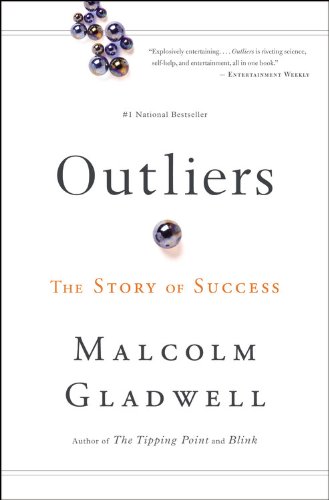 One more book we’ve already featured in another list. (In this case, its’ the top psychology booklist: check it out if you haven’t)
One more book we’ve already featured in another list. (In this case, its’ the top psychology booklist: check it out if you haven’t)
But, who can blame us for including it in another? It’s one of those books about which people talk about over and over again, in many different contexts, about various of its aspects.
After all, there’s no other book in the world which compares Bill Gates to first-rate football players, or the Beatles to successful fighter pilots. And, we certainly haven’t encountered upon any which explains why Asians are math-wizards and why there are so many Jewiish lawyers.
“Outliers” is the third of Malcolm Gladwell’s five “New York Times” bestsellers (if you didn’t know, he has published as many books!) And it’s his most applicable one.
Because, basically, it claims that success comes after 10,000 hours of practice. And he has a thousand stories to prove this.
#9. “The Power of Positive Thinking” by Norman Vincent Peale
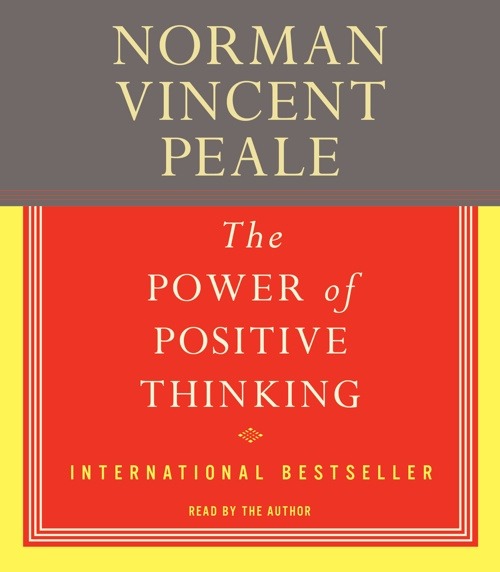 Napoleon Hill may have initiated “the positive thinking” mindset, but it was Norman Vincent Peale’s “The Power of Positive Thinking” which actually started the revolution.
Napoleon Hill may have initiated “the positive thinking” mindset, but it was Norman Vincent Peale’s “The Power of Positive Thinking” which actually started the revolution.
Published in 1952, the book remained on “The New York Times” bestseller list for over three and a half years, and inspired thousands of similar volumes. (Spoiler alert: we’ve featured the most famous two in this booklist; see above, at #8, and… well, you’ll figure it out yourself).
“The Power of Positive Thinking” basically claims that many of the things which happen in your life happen due to things you’re unable to control. What you actually can control is your reaction to them. And positive thinking is always the right way to go!
The book shares many practical bits of advice on how to eliminate negative thoughts and how to transform the alike energy into an outburst of positivity.
And, just like that, positive thoughts will make positive things happen.
Like this summary? We’d like to invite you to download our free 12 min app, for more amazing summaries and audiobooks.
#10. “The Road Less Traveled: A New Psychology of Love, Traditional Values, and Spiritual Growth” by M. Scott Peck
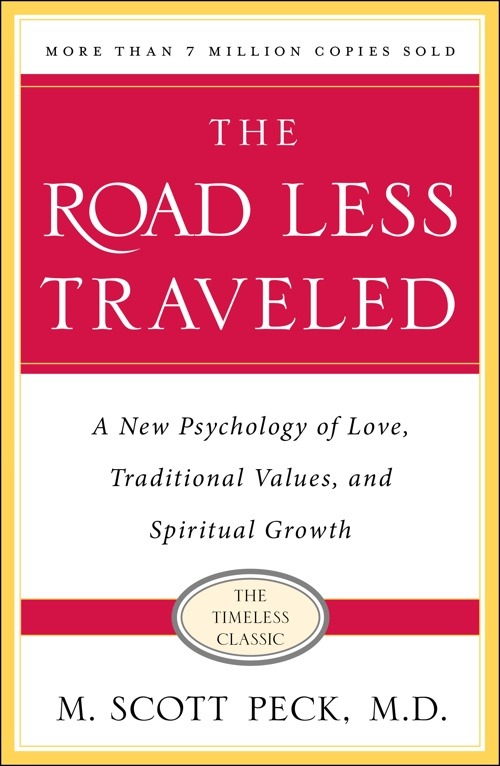 “Two roads diverged in the wood and I,” wrote America’s darling Robert Frost in 1916, “I took the one less traveled by; and that has made all the difference.”
“Two roads diverged in the wood and I,” wrote America’s darling Robert Frost in 1916, “I took the one less traveled by; and that has made all the difference.”
The title of M. Scott Peck’s classic comes from Frost. Its content is an interesting mixture of original thought, psychological research, and Christian dogma. The last one is reserved for the last two of the four parts this book is divided in, and, in our opinion, it’s the first two parts which really make the case for including “The Road Less Traveled” in our list.
And those two talk about the virtues of discipline and love. Concerning the latter, M. Scott Peck tackles some of the most common misunderstandings and arguments for love being more of an ego-transcending action, rather than a passive feeling.
As for discipline, Peck advises everyone to practice delayed gratification and responsibility acceptance – as the surefire way to living a healthier and happier life.
#11. “Daring Greatly: How the Courage to be Vulnerable Transforms the Way We Live, Love, Parent, and Lead” by Brené Brown
Brené Brown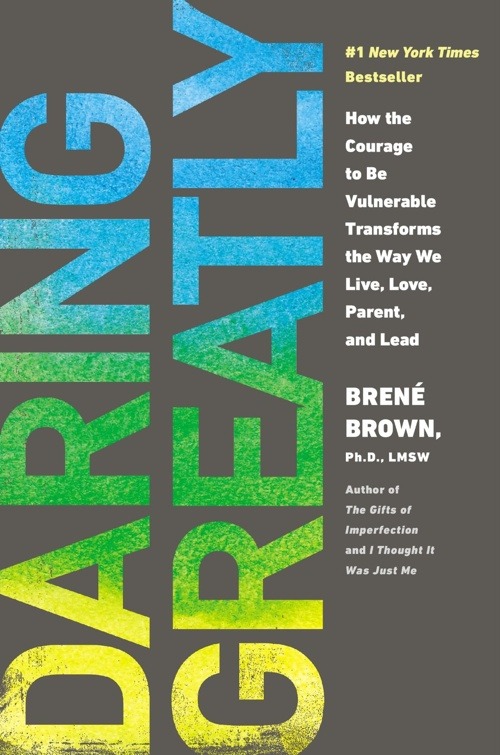 made her name in June 2010, when, at a TEDxHouston conference, she delivered one of the greatest TED speeches in history. The numbers tell only part of the whole story: with 30 million views, it’s the 4th most watched TED speech ever.
made her name in June 2010, when, at a TEDxHouston conference, she delivered one of the greatest TED speeches in history. The numbers tell only part of the whole story: with 30 million views, it’s the 4th most watched TED speech ever.
The rest of the story is in the speech itself: titled “The Power of Vulnerability,” it defends the counter-intuitive notion that living a better life goes hand in hand with embracing flaws and humiliation, shame and vulnerability.
That’s the meaning of the title of the longer and better researched version of this speech, “Daring Greatly.” It comes from a speech by Teddy Roosevelt, in which Roosevelt advises people to accept vulnerability by daring greatly.
And Brown shows the unlikely connection between vulnerability and courage. And that’s merely the beginning: it seems that vulnerable people are also more caring and happier.
#12. “The Four Agreements: A Practical Guide to Personal Freedom” by Don Miguel Ruiz
Don Miguel Ruiz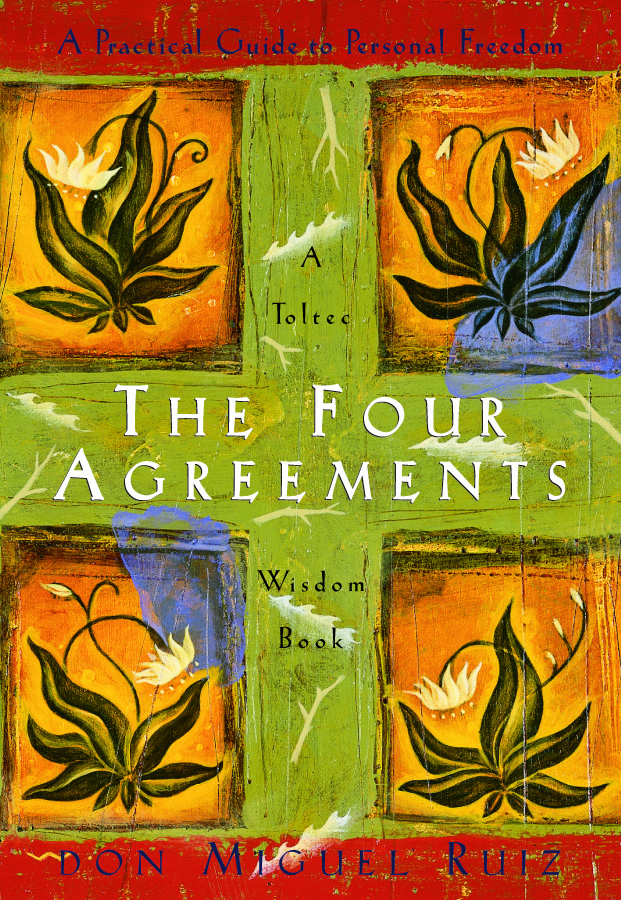 , Mexico’s “National Heirloom,” was born in the rural parts of the country as the youngest of 13 siblings.
, Mexico’s “National Heirloom,” was born in the rural parts of the country as the youngest of 13 siblings.
A near-fatal car accident made him rethink his career as a surgeon. Soon, he became a shaman’s apprentice. “The Four Agreements” is based on his experiences during this period and, supposedly, on authentic Toltec spiritualism.
A spiritual descendant of Carlos Castaneda’s “The Teachings of Don Juan,” “The Four Agreements” is a book which advocates absolute freedom through a total annihilation of the ego. The eponymous four agreements are: “be impeccable with your word,” “don’t take anything personally,” “don’t make assumptions,” and “always do your best”.
Just like Covey (our #3), Don Miguel Ruiz will not resist to add a fifth agreement a decade later. It’s “Be skeptical, but learn to listen,” and we’ve written about it extensively.
#13. “The Secret” by Rhonda Byrne
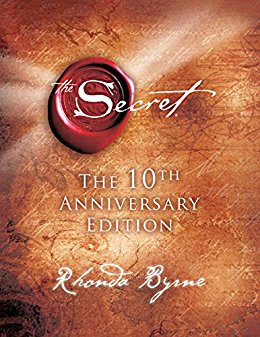 Rhonda Byrne was an executive producer for television and led quite an ordinary life in Melbourne, Australia. But, when her father Ronald died in 2004, she became so depressed, that she was even thinking about suicide.
Rhonda Byrne was an executive producer for television and led quite an ordinary life in Melbourne, Australia. But, when her father Ronald died in 2004, she became so depressed, that she was even thinking about suicide.
And just like Og Mandino – our #6 – she found new meaning in life after reading a self-help book; in her case, Wallace D. Wattles’ “The Science of Getting Rich.” Soon, she was deep into the “positive thinking” movement, and came to the conclusion that she had discovered one of the greatest secrets in history.
Soon after its publication in 2006, “The Secret” was met with overwhelmingly positive reaction from the general public. Even Oprah Winfrey said that its message was exactly the one she was trying to share with her viewers for over two decades.
And the secret?
Think positively and positive things will happen. And you can get everything you want in three steps: ask – believe – receive. It may seem too simple, but millions claim that it works.
#14. “Grit: The Power of Passion and Perseverance” by Angela Duckworth
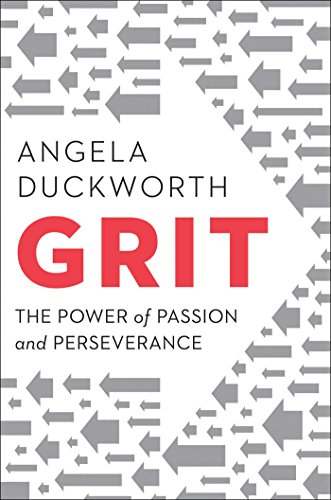 You may think that it’s talent which makes the difference between the successful and the not-so successful.
You may think that it’s talent which makes the difference between the successful and the not-so successful.
Well, Angela Duckworth claims that you are gravely mistaken. And she is an academic with a MacArthur Genius Fellowship and a Ph.D. in psychology, so maybe you should trust her more than your intuition.
In “Grit” she explains that the ones who succeed are not the most talented or the most capable ones; it’s the grittiest. And if you already know what is actually denoted by this superlative, you have Duckworth to thank: she made the word popular.
If not “grit” is, as the subtitle says, a combination of power and perseverance. Or, in layman’s terms, the thing which makes you get up the eighth time, after you’ve fallen seven times before.
This book is loaded with stories by people who’ve done that. And you can learn a lot by reading them.
#15. “The 48 Laws of Power” by Robert Greene
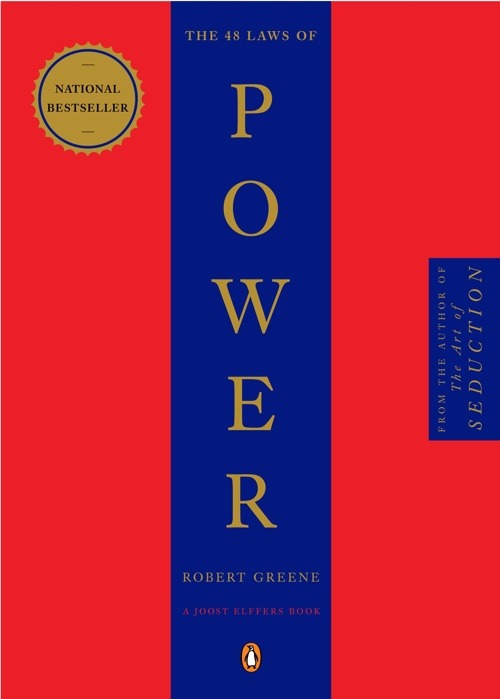 You can’t really consider a million-copies book neither a cult classic, nor a wildcard; but, analysts do the former and we’ll take our right to think the latter.
You can’t really consider a million-copies book neither a cult classic, nor a wildcard; but, analysts do the former and we’ll take our right to think the latter.
Published in 2000, “The 48 Laws of Power” is the debut book by Robert Greene, a life-long researcher into subjects such as seduction, strategy and power.
Drawing on the lives and worldview of figures as diverse as Machiavelli and Sun Tzu, Queen Elizabeth and Henry Kissinger, it lists – you’ve guessed it – 48 laws of power, together with examples of the laws being observed, transgressed, and reversed.
The book was an immediate success, especially in the prison inmates’ and hip hop community. So much so, in fact, that its semi-sequel was co-written by Greene and – wait for it… – 50 Cent! Because of the latter, it’s called “The 50th Law.”
We guess they didn’t care they skipped one.
Emir is the Head of Marketing at 12min. In his spare time, he loves to meditate and play soccer.







